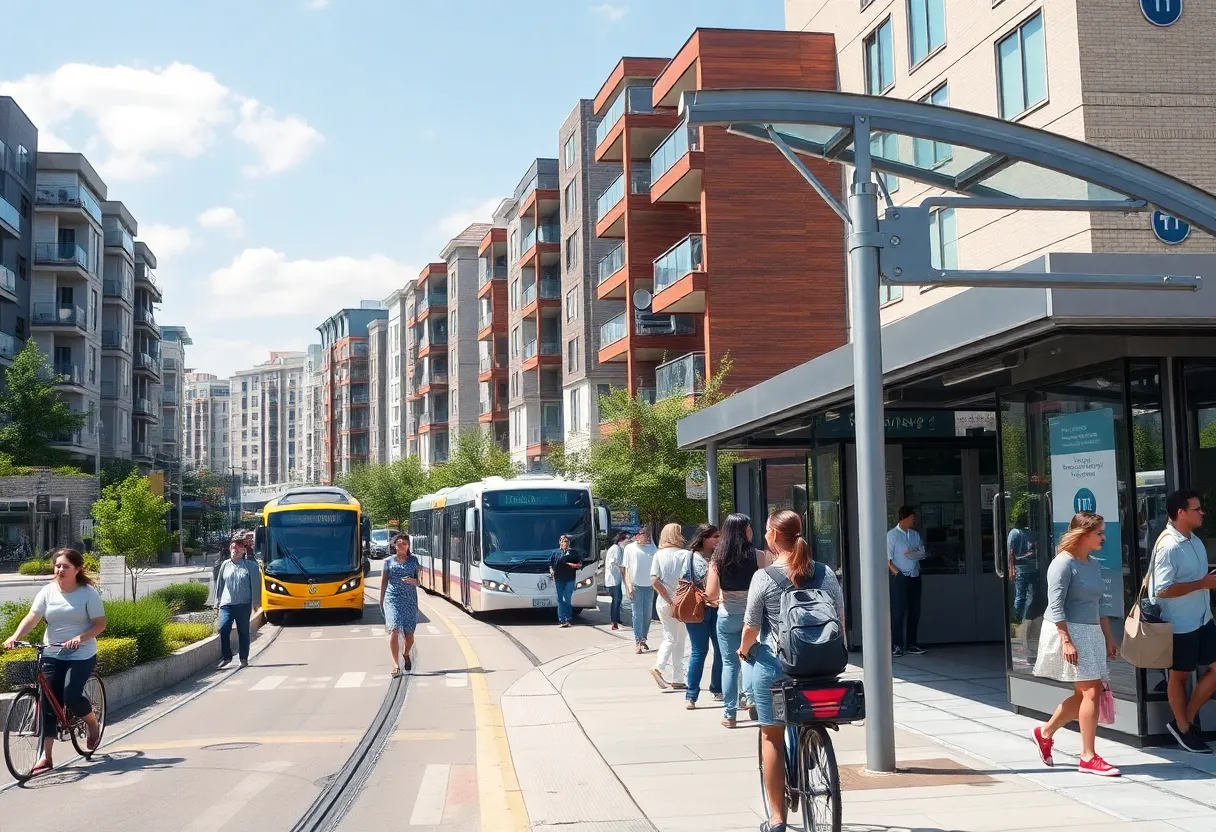News Summary
Governor Gavin Newsom has signed Senate Bill 79, allowing denser and rapid housing development near public transit stops in California. Introduced by Senator Scott Wiener, the bill seeks to address the affordable housing crisis by overriding local zoning laws. While it primarily affects major counties with significant transit, some local leaders express concerns over potential impacts on single-family neighborhoods. The law is set to take effect on July 1, 2026, marking a significant shift in California’s housing policy.
Sacramento – Governor Gavin Newsom has signed Senate Bill 79, a controversial new law that allows rapid and denser housing projects to be built near major public transit stops across California. This legislation, introduced by State Senator Scott Wiener of San Francisco, aims to tackle the state’s affordable housing crisis by overriding local zoning standards and permitting taller and denser developments around key transit hubs.
SB 79 primarily affects several counties, including Los Angeles, San Diego, Santa Clara, Alameda, Sacramento, San Francisco, and San Mateo. However, it does not immediately impact Orange County due to its insufficient rail stops meeting the required criteria. While the bill was originally intended as a statewide initiative, it was narrowed down to focus on areas with significant mass transit infrastructure.
The legislation specifically promotes construction near major transit points, such as subway stations, light rail stations, and busy bus stops. Newsom highlighted that affordable housing located near jobs, schools, and other opportunities will lead to shorter commutes and reduced living costs for Californians. Senator Wiener characterized the signing of SB 79 as a “historic step” toward addressing the ongoing housing crisis in the state.
The new law allows for multi-family developments up to nine stories high directly adjacent to major transit hubs, with height restrictions scaling down to five stories depending on the distance from these transit stations. Furthermore, the law aims to streamline the permitting process for projects located within a half-mile of major public transit stops.
Under SB 79, local transit agencies, such as Metro, are empowered to develop increased density on properties they own. While cities are given some discretion in local planning, they must align their efforts with statewide housing goals. The law establishes zoning tiers based on the type of transit available in an area, enabling faster approvals for projects meeting specific environmental, labor, and affordability standards.
Despite its intention to promote housing development, SB 79 has faced mixed reactions. Supporters assert that the bill can help alleviate the housing crisis, while critics express concerns about potential disruptions to single-family neighborhoods. A late amendment to the legislation exempted certain commuter rail lines, including Coaster and Amtrak, as well as rapid bus lines that do not meet specific criteria.
Local governments maintain the ability to propose alternative housing development plans; however, these alternatives must receive state approval. Moreover, concerns have been voiced by local leaders, including those from the San Diego Association of Governments, regarding the implications for local control and community impact. Critics, particularly those advocating for the preservation of single-family homes, argue that SB 79 undermines well-considered housing initiatives developed over many years.
As it currently stands, SB 79 is set to take effect on July 1, 2026. The passage of this law marks a significant shift in California’s approach to housing development, aimed at addressing long-standing issues related to affordability and accessibility in urban areas.
Deeper Dive: News & Info About This Topic
HERE Resources
Community Presentation on Homelessness in Coronado
Larry Lawrence Honored with Lifetime Achievement Award
Southern California Community Thrives Amid Rescue Efforts
California Households to Receive $700 Million in Electric Bill Refunds
Luxury Mansion in Coronado Sells for $24.1 Million
Coronado Mansion Sells for $24.1 Million at Auction
Coronado Addresses Water and Air Quality Concerns
San Diego County Housing Market Stagnates Amid Declining Sales
Community Honors Chief Petty Officer Charles Keating IV
Coronado City Council Honors Local Hero Kris Collins
Additional Resources
- San Diego Union Tribune: Newsom Signs SB 79
- Times of San Diego: Newsom’s SB 79 Housing Development
- CBS8: California’s New Law on Housing
- Housing Finance: Shoreline as Model Transit-Oriented Development
- Google Search: California Housing Policy

Author: STAFF HERE CORONADO
The Coronado Staff Writer represents the experienced team at HERECoronado.com, your go-to source for actionable local news and information in Coronado, San Diego County, and beyond. Specializing in "news you can use," we cover essential topics like product reviews for personal and business needs, local business directories, politics, real estate trends, neighborhood insights, and state news affecting the area—with deep expertise drawn from years of dedicated reporting and strong community input, including local press releases and business updates. We deliver top reporting on high-value events such as the Coronado Island Film Festival, productions at Lamb’s Players Theatre, community workshops at John D. Spreckels Center, and iconic celebrations at Hotel del Coronado. Our coverage extends to key organizations like the Coronado Chamber of Commerce and Visit Coronado, plus leading businesses in hospitality, dining, and tourism that drive the local economy. As part of the broader HERE network, including HERESanDiego.com, HEREHuntingtonBeach.com, HERELongBeach.com, and HERELosAngeles.com, we provide comprehensive, credible insights into Southern California's dynamic landscape.


